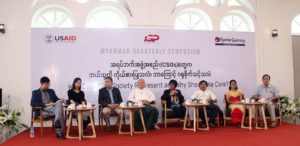 News coverage from The Joint Peace Fund Website (08 JUNE 2018)
News coverage from The Joint Peace Fund Website (08 JUNE 2018)
“Who does Civil Society represent and Why Should We care?” This was the question asked earlier this week at a forum in Yangon looking at the role of civil society. In all aspects of Myanmar’s transition towards democracy, including in the peace process, civil society organizations have played a pivotal role. This forum created an opportunity to look more closely at what exactly is meant by the term democracy and the role these organizations play in supporting it.
It was organized by the Institute for Strategy and Policy (ISP), one of the Joint Peace Fund’s implementing partners. ISP’s Executive Director U Min Zin told the participants that trust building between the population and its institutions is a core aspect of democracy, which is often understood as simply a mechanical process of holding regular elections. “In transitioning to or strengthening of democracy, high public trust in public institutions such as media, civil societies, and procedures is believed to be helpful to democratic transition. These days, people’s trust in individual leading personality has increased but it has dropped in institutions. That’s one of the reasons we organize this kind of events,” he explained. “We need to earn trust. Even if there is no trust, we should all work on building it together,” he told the audience of some 250 participants from CSOs, education foundations and international organizations.
Others felt that coordination and unity amongst CSOs was vital if CSOs were to maximise their impact. “We need to work on reconciling our different perspectives. We need to ally ourselves better, we need to coordinate better, so that we can push for the movement that we all want,” U Aung Kyaw Moe of the Social Alliance Organization from Shan State, told the audience.
Laphai Seng Raw, the founder of Metta Development Foundation, stressed the importance of accountability to the communities in which CSOs work. “We CSOs almost always believe that we represent the local communities where we work. We want to believe this and assume it is that way. When an organization grows bigger, the accountability may change. Instead of being accountable to the local people, CSOs often tend to focus on being more accountable to donors (mostly from the international) community,” Referring to the title of the event, which asked who Civil Society Represents, she added: “Therefore, I think this is a very good question and a timely one as well to question ourselves,” she said.
ISP supports debate around the issues being discussed at this panel event, with its publishing of the Myanmar Quarterly journal. One of the aims of this journal is to promote democratic leadership and strengthen civic participation by bringing together stakeholders to debate these issues. ISP’s Deputy Project Manager for Communication and Outreach Program U Nay Htun Naing said: “The Myanmar Quarterly journal is different from news media which report the current issues. We select the issues which are worth having a discussion for as topics.” He said that this is a way to compensate for the difficulty of having a more traditional academic approach to papers contained in such a journal. “In research, peer review is important academically. We want to do it but we can’t yet. In the meantime, we are trying to organize “public reviews” like this one, which can gather public voices.”
He added: “But we don’t assume that discussions could be completed at one sitting!”
